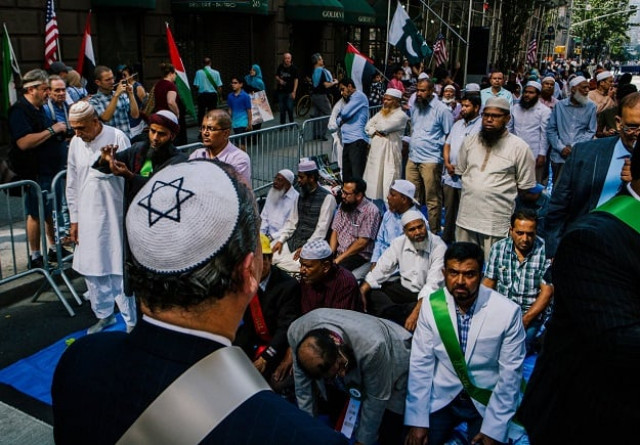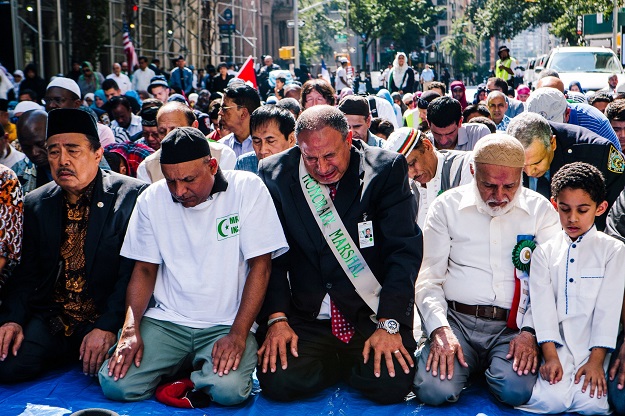Rabbi leads NYC's Muslim parade to send message of unity
Imam says 'we must fight for one another'

PHOTO: NYT
“This can serve as a wonderful paradigm,” said the grand marshal of the event and president of the Foundation for Ethnic Understanding Rabbi Schneier. “Today I am a Muslim Too.”
Donning the grand marshal sash across his chest, Rabbi Schenier was joined by parade’s founder Imam Shamsi and a Hindu priest. According to the president of the Muslim Foundation of America, the parade was founded as a means for Muslims in New York to assert their place in the city.
Jews give Muslims key to their synagogue after US mosque set ablaze
“This is a city of parades,” said Imam Ali. “We felt we must express ourselves as an integral part of the city. Parade is part of the New York identity.”
With changing narratives, the parade’s political resonance has seen constant change. It was cancelled in 2001 after September 11 attacks, a year later the march saw little people as people preferred to stay home due to Islamophobia. But this weekend’s march bordered on solidarity march. Imam Ali said the decision to tap Rabbi Schneier as grand marshal came after the violence in Charlottesville where white supremacists attacked minorities – blacks and Jews in particular. “It was decided then that this year’s parade must also be a platform,” he added.
 Another honorary marshal, Alaaeldin Moawad, cried during afternoon prayers before the start of the parade in Manhattan. PHOTO: NYT
Another honorary marshal, Alaaeldin Moawad, cried during afternoon prayers before the start of the parade in Manhattan. PHOTO: NYT“Anti-Semitism is not his fight alone; it is mine, too.” Imam Ali said, referring to the rabbi. “Islamophobia is not my fight alone; it is his, too. We must fight for one another.”
The parade saw Muslim officers from New York Police Department march in formation. It also saw protesters but Imam Ali welcomed them as “democracy in action”.
A home health aide from Queens, Mullhat Kahlef attended the march with family and friends, waving American flags. According to her, the shared faiths made rabbi a perfect choice for grand marshal. Kahlef said they usually attended the parade for fun but in this year of travel bans, they “came to make a statement.”
US Muslims raise over $50,000 to repair vandalised Jewish cemetery
The rabbi leading the march surprised Al Knight from Brooklyn as well. “The world looks at New York — we are the capital of the world,” he said. “If other countries see that, they might become a little more pliable.”
“This is good,” he said while selling flags at the event. “This is really good.”
“To see the Muslims like this in the middle of the street here, that means Muslims have some consideration, that we are being given a chance,” said Diakita Amadou, who works at a hotel on 38th street in Manhattan. “That’s New York showing us a little bit that Muslims have a right, just like other people.”
This article originally appeared in The New York Times.



















COMMENTS
Comments are moderated and generally will be posted if they are on-topic and not abusive.
For more information, please see our Comments FAQ